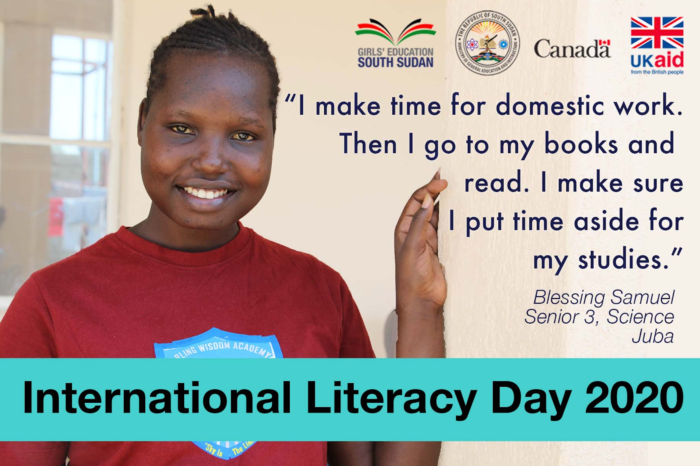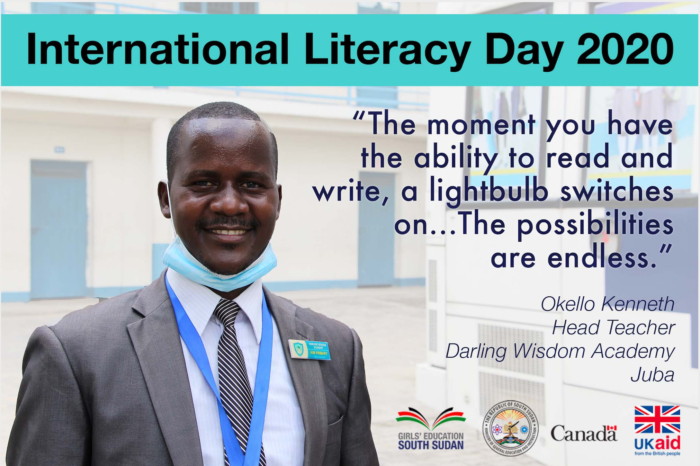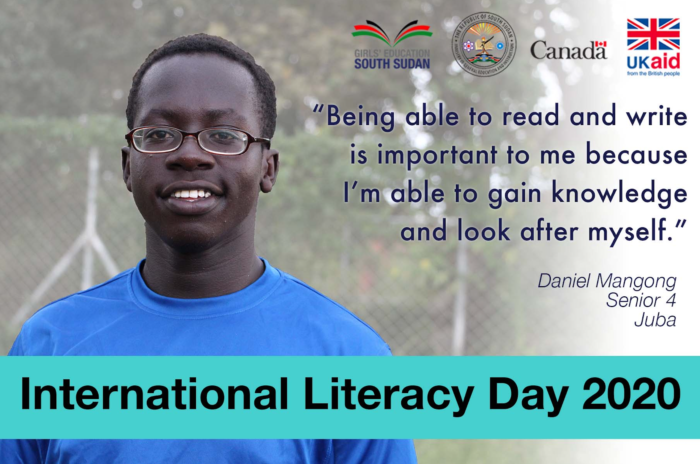International Literacy Day
September 8, 2020 12:25 pmToday we celebrate #InternationalLiteracyDay 📚
The issue of literacy is a key component of the UN’s Sustainable Development Goals – one of the targets within Sustainable Development Goal 4 is to ensure that all young people achieve literacy and numeracy and that adults, who lack these skills are given the opportunity to acquire them.
South Sudan has one of the lowest literacy rates in the world. Recent data from the World Population Review shows that only 27% of South Sudanese people aged 15 or older are literate. Additionally, while 35% of men can read and write only 19.2% of women possess these important skills (World Population Review).

These poor literacy indicators are a product of the protracted crisis, which has left behind limited educational opportunities, poor infrastructure and a lack of qualified teachers and basic learning materials. These challenges need to be addressed to bring an end to a cycle that leaves people without any access to education.
Without the ability to read or write, communication skills are weakened and employment opportunities are limited. Therefore, giving people the chance to access to an improved education such as literacy skills lowers the chance of one being in poverty and gets them on the path to an overall higher quality of life.

Schools remained closed in South Sudan and across the world. In a country where access to TV and the internet is extremely low, distance learning fails to reach the vast majority of learners. Learners with no access to media, as well as those with hearing impairments, are receiving no instruction, feedback, or interaction with teachers. The literacy gap between disadvantaged children and their peers is likely to skyrocket and could hold them back for the rest of their lives.
To try to limit this gap, the Ministry of General Education and Instruction has been broadcasting lessons on the radio as part of their distance learning strategy. Radio is the most prevalent form of media in South Sudan and the best way to reach learners across the country. Okello Kenneth, the Head Teacher of Darling Wisdom Academy, has been one of the teachers delivering the ‘Education on Air’ programme through radio.

Now, in a world of COVID-19, literacy is even more important; it helps to bridge the gap towards good health. The rapid development of COVID-19 into a pandemic has called for people to quickly adapt their behaviour, acquiring and applying health information. Those that can’t interpret health messaging are at a disadvantage. In this case, literacy can literally save lives. As Daniel Mangong (above) puts it, being able to read and write allows him to read important messages and to “look after” himself.
As part of our response to COVID-19, GESS has been working with partner BBC Media Action to produce and broadcast radio public service announcements (PSAs) that deliver vital information about COVID-19 and overall hygiene and sanitation, including Ministry of Health and World Health Organisation (WHO) guidance on physical distancing and protective behaviours, to help people keep themselves and their families safe. We worked with 31 partner radio stations to air the PSAs in multiple languages across the country, reaching remote communities. These vital messages have also been adapted to SMS and video, released through SSBC TV and online channels. Videos were complemented with South Sudan sign language interpretations to reach those with hearing impairments.
As we move forward, we need to understand how COVID-19 has affected literacy, as well as how we can position literacy in the recovery phase in order to build back better.
Important questions for consideration as we move forward into the recovery phase:
What is the impact of the COVID-19 crisis on youth literacy educators and teaching and learning?
What are the lessons learnt?
How can we effectively position literacy learning in global and national responses and in strategies for the recovery and resilience-building phase?
Categorised in: Featured, GESS Events, Quality Education
Comments are closed here.